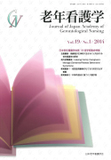Japanese
English
- 販売していません
- Abstract 文献概要
- 参考文献 Reference
抄録
本研究は療養環境に関連した聴覚刺激による成人と高齢者の生理的および主観的な反応の特性を明らかにすることを目的とした.成人群30名(平均年齢23.2歳,SD=4.6),高齢者群30名(平均年齢74.6歳,SD=5.7)を対象とし,6種類の聴覚刺激(音楽に合わせて体操をしている場面,談話室の複数個所で会話をしている場面,ホワイトノイズ等)の提示に対する,心拍変動と皮膚電位反応と快適度等の主観的評価のデータを得た.
皮膚電位反応で無刺激時と比較して有意な変化がみられたのは,成人群では,談話室/会話とホワイトノイズ,高齢者群では,球技/レク,道路/救急車で有意に上昇していた.高齢者にとって快適と評価されやすい音,想起しやすい音等,音に対する反応の特徴がいくつか明らかになった.また,高齢者と成人との間に自律神経指標だけではなく,主観的評価でも差があったことから,環境調整の際はケア提供者側の主観的評価に偏重しない判断をすることが求められている.
聴覚刺激ごとに年齢を共変量として共分散分析を行った結果,年齢の影響を考慮してもLF/HFは聴力低下の有無による有意差が認められ,談話室/会話等の聴覚刺激で聴力低下有群が高かった.
The present study aimed to compare the physiological responses and subjective assessments caused by environmental stimuli between young adults and the elderly. Research was conducted using a quasi-experimental design with 30 young adults [mean age 23.2 years, standard deviation (SD) = 4.6] and 30 community-dwelling elderly people (mean age 74.6 years old, SD = 5.7). Data were obtained regarding heart rate variability, skin potential response (SPR), comfort level, and other subjective assessments, following six types of auditory stimuli of specific situations. These included exercising to music, conversations taking place in multiple locations in a common room, white noise, etc. Compared with changes in the non-stimulus, SPR significantly increased with common room conversation (p <0.01) and white noise (p <0.01) for the young adult group, and with ball games/recreation (p <0.01) and traffic/ambulance (p <0.01) for the elderly group. Several characteristics of the response to sounds were clarified for the elderly, including sounds that are more likely to be assessed as comfortable and those that are easier to recall. In addition, the elderly and young adults differed not only in autonomic nervous indicators but also in subjective assessments. While providing environmental care, nurses need to make appropriate judgments that are not overly subjective. Analysis of covariance on each auditory stimulus, with age as a covariate, showed that LF/HF in the hearing impairment group was significantly higher than that of the non-hearing impairment group for common room conversation (p <0.01), etc.
Copyright © 2014, Japan Academy of Gerontological Nursing All rights reserved.


